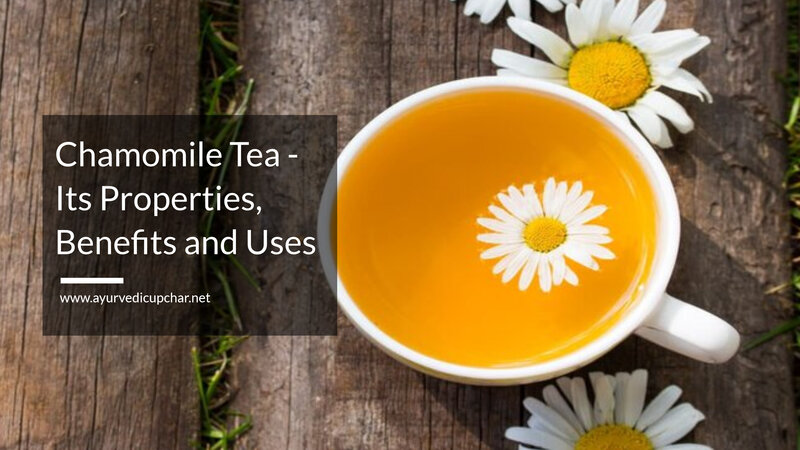Chamomile Tea – Its Properties, Benefits and Uses
 Chamomile tea is known for its medicinal applications. Although it does not serve to cure diseases, it can be an aid to calm certain symptoms. Discover its benefits.
Chamomile tea is known for its medicinal applications. Although it does not serve to cure diseases, it can be an aid to calm certain symptoms. Discover its benefits.
Chamomile tea is a natural drink that became popular for its interesting medicinal applications. While many of its uses come from popular literature, there is now a wide variety of research supporting its properties.
The plant is part of the Asteraceae family and there are numerous species. However, the most used in the preparation of tea are Matricaria chamomilla and Matricaria Nobilis. What are its main characteristics? What benefits are attributed to it? Find out!
Chamomile tea properties
Chamomile tea is obtained from the dried flowers of the plant infused in water. It is characterized by having a light floral aroma and a mild flavor that is pleasant to the palate.
Furthermore, as detailed in an article published in Pharmacognosy Reviews, it concentrates on bioactive compounds with therapeutic potential.
Specifically, it has substances such as:
- Sesquiterpenes.
- Flavonoids.
- Coumarins.
- Polyacetylenes.
This composition, which brings together around 120 chemical constituents, gives the plant various health properties. Thus, both chamomile tea and extracts and other presentations are said to have antimicrobial, anti-inflammatory, antioxidant, anxiolytic, and antispasmodic activity.
Main benefits of chamomile tea
In folk medicine, chamomile tea is one of the protagonists. Although today it is known that it should not be the first-line treatment against diseases, there are those who use it as a complement to alleviate the symptoms of certain conditions. What is it for?
1. Helps to relieve menstrual pain
The phenolic compounds contained in chamomile tea have an antispasmodic effect that favors the relief of menstrual pain. In a study published in the Iranian Journal of Obstetrics, Gynecology, and Infertility, women who consumed this tea for a month were able to reduce the severity of dysmenorrhea.
On the other hand, as it was a relaxing drink, the participants also reported less period-associated anxiety. Some hypotheses suggest that the plant decreases the production of prostaglandins, substances responsible for pain and inflammation. In either case, more research is required.
2. Supports digestive health
The digestive properties of chamomile tea are the best known. For hundreds of years, this drink has been prepared to soothe gastrointestinal complaints such as flatulence, indigestion, diarrhea, nausea, and vomiting.
In this regard, the evidence is still limited; however, a systematic review in the Electronic Physician Journal details that these effects are attributed to its antimicrobial, anti-inflammatory, and relaxing potential.
3. Promotes a better quality of sleep
There is no natural herb that alone can combat sleep disorders. Despite this, some plants such as chamomile serve as allies to sleep better. Due to its content of apigenin, a type of antioxidant, it stimulates receptors in the brain and reduces insomnia.
In research published in the Journal of Advanced Nursing, postpartum women who consumed chamomile tea for two weeks reported better sleep quality. In turn, they showed fewer depressive symptoms associated with difficulty sleeping.
4. Benefits control of blood glucose levels
Improving your eating habits and lifestyle is essential to keep blood glucose levels under control. However, for cases of specific glucose rises, it is favorable to ingest drinks such as chamomile tea. For what reason?
The studies suggest that plant extracts help stimulate the functions of the pancreas to produce insulin body is responsible. The latter is the hormone responsible for regulating sugar levels in the body. And while evidence is lacking, the findings have been seen as promising.
5. Supports heart health care
The antioxidants in chamomile tea, especially flavonoids, have a beneficial effect on heart health. Of course, this is not to say that it can be a substitute for medical treatment for heart conditions. Simply, included in the regular diet, it helps reduce the risk of disease.
A small study published in the Journal of Endocrinological Investigation concluded that diabetic patients who consumed chamomile tea with meals had improvements in their total cholesterol, triglyceride, and bad cholesterol levels.
What other benefits does chamomile tea provide?
The use of chamomile in tea and other presentations has spread throughout the world. Because of this, the drink is attributed to other benefits in addition to those mentioned. It is important to note that many of these applications come from anecdotal data and lack evidence:
1. Anxiety and Depression: the sedative properties of chamomile tea are beneficial against states of mental stress, such as anxiety and depression. Although it is usually used in aromatherapy for this purpose, its consumption in tea is also useful.
2. Skin Health: Topical application of chamomile tea has shown positive effects in soothing skin symptoms such as irritation, redness, and flaking. There are even those who use it for burns or problems such as eczema.
3. Colds: Inhaling the fumes given off by hot chamomile tea works as an adjunct against nasal congestion and irritation caused by the cold.
4. Bone Care: the evidence on the consumption of chamomile tea and the prevention of bone diseases is still weak. Despite this, some hypotheses suggest that this drink has anti-estrogenic effects that help prevent loss of bone density.
5. Other Benefits: Chamomile may help sleep, skin, and cardiovascular health conditions
Who should avoid drinking chamomile tea?
For most healthy adults, drinking chamomile tea is safe and risk-free. To date, there are no reports of fatal or toxic adverse reactions from ingesting this drink. Even so, it is not recommended in the following cases:
- History of allergy to chamomile or plants of the daisy family.
- Previous personal records of pollen allergy.
- People with chronic kidney or liver diseases should consult a doctor.
- Infants and young children.
What is there to remember about chamomile?
Chamomile, whether in tea or other forms, serves as a supplement to improve the symptoms of certain conditions. However, it should not substitute for medical treatments for any reason.
Those who wish to consume this plant in tea can safely ingest 2 or 3 cups a day. Still, if there are previous illnesses or if you are taking any medication, it is best to consult your doctor.
Note: The uses of chamomile tea are not a substitute for pharmacological medicine, but they can be helpful.






















